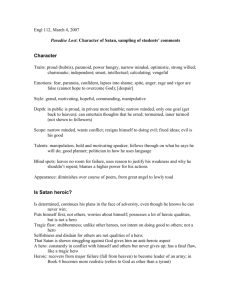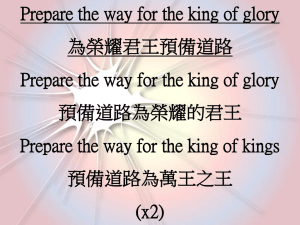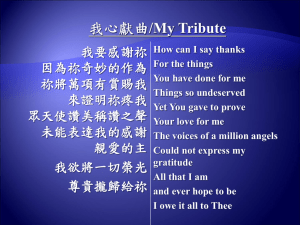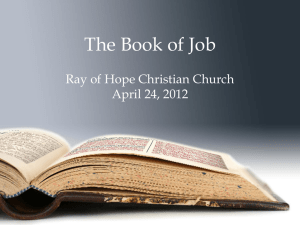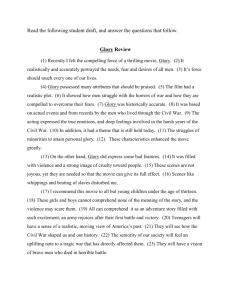In the Wake of a Tsunami
advertisement
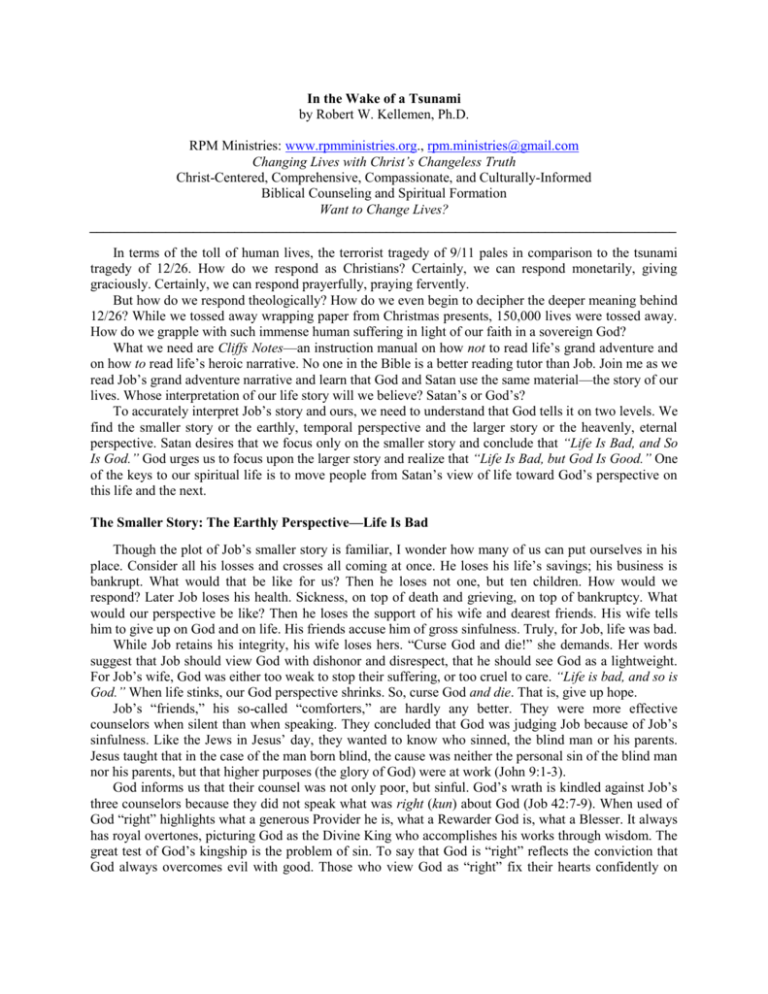
In the Wake of a Tsunami by Robert W. Kellemen, Ph.D. RPM Ministries: www.rpmministries.org., rpm.ministries@gmail.com Changing Lives with Christ’s Changeless Truth Christ-Centered, Comprehensive, Compassionate, and Culturally-Informed Biblical Counseling and Spiritual Formation Want to Change Lives? _____________________________________________________________________________________ In terms of the toll of human lives, the terrorist tragedy of 9/11 pales in comparison to the tsunami tragedy of 12/26. How do we respond as Christians? Certainly, we can respond monetarily, giving graciously. Certainly, we can respond prayerfully, praying fervently. But how do we respond theologically? How do we even begin to decipher the deeper meaning behind 12/26? While we tossed away wrapping paper from Christmas presents, 150,000 lives were tossed away. How do we grapple with such immense human suffering in light of our faith in a sovereign God? What we need are Cliffs Notes—an instruction manual on how not to read life’s grand adventure and on how to read life’s heroic narrative. No one in the Bible is a better reading tutor than Job. Join me as we read Job’s grand adventure narrative and learn that God and Satan use the same material—the story of our lives. Whose interpretation of our life story will we believe? Satan’s or God’s? To accurately interpret Job’s story and ours, we need to understand that God tells it on two levels. We find the smaller story or the earthly, temporal perspective and the larger story or the heavenly, eternal perspective. Satan desires that we focus only on the smaller story and conclude that “Life Is Bad, and So Is God.” God urges us to focus upon the larger story and realize that “Life Is Bad, but God Is Good.” One of the keys to our spiritual life is to move people from Satan’s view of life toward God’s perspective on this life and the next. The Smaller Story: The Earthly Perspective—Life Is Bad Though the plot of Job’s smaller story is familiar, I wonder how many of us can put ourselves in his place. Consider all his losses and crosses all coming at once. He loses his life’s savings; his business is bankrupt. What would that be like for us? Then he loses not one, but ten children. How would we respond? Later Job loses his health. Sickness, on top of death and grieving, on top of bankruptcy. What would our perspective be like? Then he loses the support of his wife and dearest friends. His wife tells him to give up on God and on life. His friends accuse him of gross sinfulness. Truly, for Job, life was bad. While Job retains his integrity, his wife loses hers. “Curse God and die!” she demands. Her words suggest that Job should view God with dishonor and disrespect, that he should see God as a lightweight. For Job’s wife, God was either too weak to stop their suffering, or too cruel to care. “Life is bad, and so is God.” When life stinks, our God perspective shrinks. So, curse God and die. That is, give up hope. Job’s “friends,” his so-called “comforters,” are hardly any better. They were more effective counselors when silent than when speaking. They concluded that God was judging Job because of Job’s sinfulness. Like the Jews in Jesus’ day, they wanted to know who sinned, the blind man or his parents. Jesus taught that in the case of the man born blind, the cause was neither the personal sin of the blind man nor his parents, but that higher purposes (the glory of God) were at work (John 9:1-3). God informs us that their counsel was not only poor, but sinful. God’s wrath is kindled against Job’s three counselors because they did not speak what was right (kun) about God (Job 42:7-9). When used of God “right” highlights what a generous Provider he is, what a Rewarder God is, what a Blesser. It always has royal overtones, picturing God as the Divine King who accomplishes his works through wisdom. The great test of God’s kingship is the problem of sin. To say that God is “right” reflects the conviction that God always overcomes evil with good. Those who view God as “right” fix their hearts confidently on 2 God, trusting his affectionate sovereignty even during tempestuous times (John Oswalt, Theological Wordbook of the Old Testament, Vol. I, pp. 433-434). Job’s counselors failed to see God’s trustworthy heart. Specifically, they succumbed to the culture of their day that believed that God was a tit-for-tat God. “If you are good, then God will be good to you. If you are bad, then God will treat you poorly. Life is bad because God is bad.” Their God was like the gods on Star Trek—cruel gods who took rather than gave. Gods who demanded to be “fed” by the populace because they would starve without their sustenance. Together, this rather motley crew sees only the smaller story—the earthly perspective. They accept Satan’s interpretation of Job’s life story. “God is a Hoarder, not a Rewarder. Job is a zero, not a hero.” The vast majority of men and women live in the middle of such a story. Dark sentences clouding their thinking. “Life is bad, and so is God.” “Life is bad because God is mad.” “God’s a Hoarder, not a Rewarder.” “I’m a loser, not a hero.” “Forget thriving, I’m barely surviving.” The Larger Story: The Universal Perspective—Life Is a Battleground What can change such interpretations? How did Job maintain his heroic integrity? How can we help our spiritual friends to keep trusting through tragedy? We must open the pages to the larger story, the eternal perspective, God’s universal viewpoint. As later readers of Job’s story, we see what the original characters, including Job, never saw. God unveils for us the rest of the story. He pulls back the curtain to expose the heroic narrative that Job, and you and I, are engaged in every second of our lives. This larger story demonstrates that “Life is bad, but God is good.” It teaches that we are leading characters in God’s drama of redemption, that we have a special, heroic role to play. Step behind the curtain to gain a spiritual perspective on everyday life (Job 1:6-12; 2:1-6). God is bragging about Job. God brags about you, too. Satan, the accuser of the brethren, slanders us before God. But God says, “Did you see Betty? How she trusts me! What a godly life she’s living! She’s showing the entire universe that I have a trustworthy heart. I’m so proud of her! She’s a real heroine.” Satan responds, “But would Betty trust your so-called good heart if her life were bad? Would she demonstrate to the entire universe that you were a good God, if her life were a mess? Or would she curse you, seeing you as a lightweight God, a Hoarder, a tit-for-tat Deity?” The scene is set. God announces the real theme of the drama of Job’s life, of Betty’s life, of your life, and of your spiritual friend’s life. Life is a battleground between two views of God—God as a lightweight Hoarder who cannot be trusted, or God as our affectionate Sovereign who we can always trust to be a grace Rewarder. We are not bit players in an off-Broadway play. We have leading roles on Broadway. God, the great Director, hands us the script. Act after act, he orchestrates everything so our lives can be a testimony to his trustworthiness. We say to God, our Director, “Uh, let me see if I understand your script. I have a lead role. There’s no stunt double. You have me not getting the girl, losing the big game, getting fired, going through two church splits, my son getting cancer, and my daughter getting divorced. All the while I’m shouting, ‘God is good! Trust his heart!’ Do I have it about right?” God says, “Yes.” To Job, and to us, God seems more like the director of a Matrix movie than a Leave It to Beaver television episode. And why not, since life is a battleground, a grand adventure, a love story in the middle of Armageddon. Trace Yahweh’s relationship to Job and you’ll discover that Yahweh is always ready for some new, outrageous self-disclosure meant to subvert Job’s dominant earth-bound reality. As Walter Bruggemann notes, the Old Testament is the constant retelling of life with Yahweh—our Wild Lover. Our Wild Lover, our Loving Sovereign, uses life’s battlegrounds to reveal himself more fully to us. With Job, God discloses his nature by discussing nature (Job 38-41). “Job, you think you’re pretty smart. You consider yourself strong. Could you set the constellations in space? Do you understand the ways of 3 the sea and the stars?” God offers Job a new view of the old stars he had seen every day of his rural existence. More than that, Job receives a new view of his place in God’s grand universe. God’s character is astonishing and Job’s role amazing. Job’s script requires him to play the part of an epic hero who demonstrates to the entire universe that God’s heart can and should be trusted through tragedy. He tenaciously clings to the conviction that even when life is ugly, God is beautiful. God’s hero sees comedy where others see only tragedy. Few people believed it would be possible to make a comedy set in the Nazi concentration camps of WW II. However, in Life is Beautiful, Roberto Benigni had a vision of one possible way to tell this tale of horror without dehumanizing the lead characters. There are two distinct stages in the film. The first half concentrates on Guido Orefice’s efforts to woo his chosen lady. He is funny, courageous, and irrepressible in his attempts to win the heart and hand of the lovely Dora. He uses cunning strategies that take advantage of all the quirks of Florence and its people to impress the woman he constantly greets with, “Buono giorno Principessa” (Good day Princess). Soon they are married and joined by a precocious son, Giosué. He clearly takes after his father and is the apple of his parents’ eyes. It would take a hard-hearted person to avoid loving this little angel; an angel who will go to any extreme to avoid his bath time. His other main concern seems to be getting enough time to play with his toy tank. However, love and optimism are unable to dam the tide of history. Italy aligns with Germany and begins persecuting their Jewish population. On Giosué’s fourth birthday, while Dora is out, soldiers seize him and his father, stacking them like cattle into a train headed for the concentration camps. As soon as Dora realizes what has happened, she follows them into the depths of hell. Although Guido doesn’t know exactly what’s going to happen, he knows enough to want to shield his son in the only way he can. While they’re in the train, he concocts a story to convince Giosué that they’re taking a surprise trip to celebrate his birthday. As their situation worsens, the fiction becomes more convoluted. Guido controls every aspect of his son’s perception to persuade him that they’re participating in a most challenging competition, with a full-sized tank as the prize! Despite the horrors of the situation, death all around, brutal labor, starvation, and dehumanizing barracks; Guido focuses all his efforts on his son’s perception of reality. In the riveting final scene, the war is ending. The Italian soldiers realize that they must destroy all “evidence” of their atrocities. Desperate, Guido hides his son in a metal container with peep holes. Later that day the guards force Guido on a death march. Realizing that his son can see him, he whistles, smiles, and winks. Gun shots sound his death, out of sight of his son. The next morning, all is quiet. Giosué finally leaves his tiny cage. Thunderous rumbling noises in the distance announce the coming of tanks. The huge barrel rounds the corner first. Rather than being terrified, Giosué shouts, “We won! We won!” He’s sure the tank is his personal prize for winning the grand competition. Like Giosué, Job evidences a child-like faith in God’s greatness and goodness, along with a humble trust that his Father’s version of reality is the only one that truly matters. Some may read the final chapters of Job and simply see God the Bully, pulling rank on Job. That’s not how Job saw it. He recognized God’s affectionate sovereignty. He perceived the holy love of God. He understood the intimate intimacy of God’s presence. Yes, God is big, but he is also good. Job testifies to God’s good heart by naming his first daughter Jemimah. Her name means “dove, affectionate one.” In Job’s day, a child’s name reflected the spiritual beliefs of her parents. Job tells us, “I’ve looked at life from both sides now. From up and down and all around. I’ve seen it from my perspective and from God’s, from the earth and from the heavens. And I can tell you from personal experience that God is good. He is loving. He is an affectionate Dove.” Thousands of years later, the biblical author James reminds us of Job’s God-perspective. “You have heard of Job’s perseverance and have seen what the Lord finally brought about. The Lord is full of compassion and mercy” (James 5:11). In the face of suffering, Job saw the face of his compassionate and merciful God. 4 And God testifies to Satan. “Do you see my heroic servant Job? Though his life was horrible, he says I am beautiful!” The Intersection of God’s Story and Ours Job’s role is ours also. Watch as Paul draws back the curtains for the Church. Although I am less than the least of all God’s people, this grace was given me: to preach to the Gentiles the unsearchable riches of Christ, and to make plain to everyone the administration of this mystery, which for ages past was kept hidden in God, who created all things. His intent was that now, through the church, the manifold wisdom of God should be made known to the rulers and authorities in the heavenly realms, according to his eternal purpose which he accomplished in Christ Jesus our Lord (Ephesians 3:8-11, emphasis added). Father’s eternal intent and our earthly purpose mingle when our lives testify that “God is good even when life is bad!” Eugene Peterson’s paraphrase of Paul’s words captures the essence of our plan: And so here I am, preaching and writing about things that are way over my head, the inexhaustible riches and generosity of Christ. My task is to bring out into the open and make plain what God, who created all this in the first place, has been doing in secret and behind the scenes all along. Through Christians like yourselves gathered in churches, this extraordinary plan of God is becoming known and talked about even among the angels! (Peterson, The Message, p. 2129, Ephesians 3:8-11, emphasis added). Angelic forces stand on tiptoe to gain a glimpse at the Church. There’s an unseen world just as real as our present existence. It’s a world of heavenly powers—the realm of angels and demons. As God accomplishes his eternal plan of redemption, the entire universe watches. We—the Church—are the main actors and actresses in his drama of redemption. We have the privilege and responsibility to reveal our Lover’s good and gracious heart to all creation. We are the guardians of the sacred truth (1 Timothy 3:15). When the final curtain draws back on all of history we will declare the truth of Christ’s victory narrative. And when he had taken it, the four living creatures and the twenty-four elders fell down before the Lamb. Each one had a harp and they were holding golden bowls full of incense, which are the prayers of the saints. And they sang a new song: “You are worthy to take the scroll and to open its seals, because you were slain, and with your blood you purchased men for God from every tribe and language and people and nation. You have made them to be a kingdom and priests to serve our God, and they will reign on the earth.” Then I looked and heard the voice of many angels, numbering thousands upon thousands, and ten thousand times ten thousand. They encircled the throne and the living creatures and the elders. In a loud voice they sang: “Worthy is the Lamb, who was slain, to receive power and wealth and wisdom and strength and honor and glory and praise!” Then I heard every creature in heaven and on earth and under the earth and on the sea, and all that is in them, singing: “To him who sits on the throne and to the Lamb be praise and honor and glory and power for ever and ever!” The four living Creatures said “Amen,” and the elders fell down and worshipped (Revelation 5:8-14, emphasis added). What’s the plot of God’s larger story? What’s the nature of our leading part in his grand adventure? What’s the point of life? The point always revolves around reveling in our Worthy Groom (enjoying him), revealing how lovely our Worthy Groom is (exalting him), and reflecting our Worthy Groom (emulating him). 5 Nothing can thwart our purpose. Every experience of suffering is an opportunity to glorify God. Our lives are on display. We are on a universal stage. Not only is the whole world watching; the entire universe is gripped by the drama of our lives. They want to know if we will display God’s glory by trusting his good heart even when life stinks. Knowing our role is both frightening and freeing. In Black Hawk Down, the retelling of the 1993 incident in which less than one hundred Army Rangers and Delta Forces were swarmed upon by over one thousand Somali fighters, we witness fear and freedom. “Grimes” is known not for his battle courage but for his expertise in coffee making. When an injury to a fellow soldier forces him into combat, his fears surface. Trained to fight, part of him prefers the safety far from the frontlines. Making coffee seems a preferable role to making war. Grimes was not only trained for combat, he was called to combat. Little by little, as the planned onehour mission erupts into a thirty-six hour life-and-death dog fight, Grimes finds his true calling and accepts his larger role in the story. At a pivotal point when a fellow soldier is shot, bleeding, and pinned down under heavy enemy fire, it’s Grimes who volunteers to risk his life. Rescuing a friend seems preferable to making coffee. Grimes discovers the freedom to be all that he can be, all that God created him to be. His friend’s wounds are critical. Despite frantic calls for evac, help will not arrive in time. The medic, with little experience and less equipment, does all he can, first to save his life, later to minimize his pain. Bleeding to death and knowing the end is near; the wounded soldier expresses his last request to his Sergeant. While his Sergeant grips his bleeding body and strains to hear his fading voice, the dying soldier asks that a message be conveyed to his parents. “Tell them that I fought like a hero.” He, too, has identified and accepted his role in the larger story. He dies free, without regrets of battles avoided or roles refused. Paul reminds us that we can’t have the glory without the suffering. “. . . indeed we share in his sufferings in order that we may also share in his glory” (Romans 8:17b). When we are in Christ, we’re in him for the whole experience. More than that, Paul reminds us that we can handle both suffering and glory because we are heroes. “. . . we are more than conquerors . . .” (Romans 8:37b). Between these two reminders, we find a third point to remember—the future. “I consider that our present sufferings are not worth comparing with the glory that will be revealed in us” (Romans 8:18). We are heroes and heroines in God’s grand adventure narrative. At times fear tempts us to prefer the coffee-making roles. But eternity calls us to accept the death-to-self roles. We’ll do anything to hear Father’s, “Well done, Son.” “I’m so proud of you, my Daughter.” We’re called to brag on God during battle. We refuse to curse the General who sends us into combat. We refuse to request a lesser role. Instead, bullets flying around, disasters sweeping over us; we bless our affectionate Sovereign. Tsunami Theology Answers aren’t easy. And certainly, when trying to comfort a victim, we don’t begin with answers— we begin with silence, love, hugs, tears… But eventually, people want to know how we can trust that God is good even when life is bad. When life stinks, our perspective shrinks. In stinking, shrinking times, we share God’s larger story— we share tsunami theology. We open the curtains to reveal God’s ultimate plan—the final victory of good over evil—a victory that we win every day when we trust God’s good heart. *Excerpted and altered from Soul Physicians: A Theology of Soul Care and Spiritual Direction, with permission of the author, Dr. Robert W. Kellemen (www.rpmministries.org, rpm.ministries@gmail.com).
